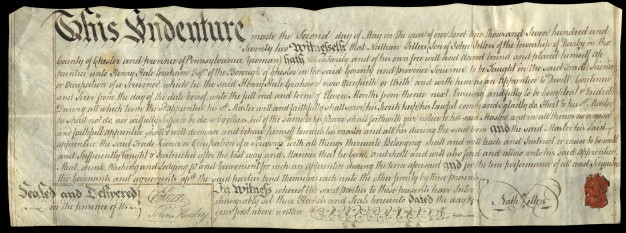Datafied Redemptioners/Redeeming the Data: What’s New at the APS Center for Digital Scholarship
The American Philosophical Society’s Center for Digital Scholarship is delighted to announce the culmination of another one of our Open Data Initiatives. The Book of Record of Indentures of Individuals bound out as apprentices, servants, etc., and of German and other Redemptioners in the office of the Mayor of the City of Philadelphia from October 3rd, 1771 to October 5th, 1773—a massive tome that contains the details of over 5000 colonial indenture contracts—is now fully digitized, transcribed, and freely available in ‘datafied’ CSV format in the APS Digital Library and the APS GitHub repository. As with our previous two open data projects (the Eastern State Penitentiary admission books and Benjamin Franklin Post Office Records), we have submitted these robust datasets for publication in UPenn’s Magazine of Early American Datasets (MEAD).
This volume contains a wealth of information about immigration patterns, trades, servitude, and family units on the cusp of the American Revolution. The entries bring centrality to the lives of working-class people that is hard to find in the kind of historical records generally kept in archives, and the APS is glad to make available to researchers. The book has great potential for new scholarship via computational analysis and it will be a boon to researchers hoping to incorporate methodologies of the digital humanities into their studies.
It is important to note that this book is only one piece of a very large and complex puzzle. Records like the ones kept in this ledger can only provide descriptions of marginalized citizens from the point of view of the people invested in their commodification. By design, these entries reduce human beings to data points: prices, dates, ages, and names (sometimes erroneously spelled). They do not represent the thoughts, feelings, perspectives, or lived experiences of the people listed in these pages.
But when cross-referenced with other contemporary sources, these records can bring the lives of laboring Philadelphians into clearer focus. This kind of humanistic analysis helps smooth the contours of raw data points into the shape of a full, human life, painting a vibrant picture that data alone cannot depict. This summer’s Digital Humanities Fellow, Nicôle Meehan, will be working to analyze the volume in light of these considerations and in conversation with other relevant documents. Some possible sources for comparison include publications like “Record of Pennsylvania Marriages Prior to 1810,” and “Names of Foreigners who took the Oath of Allegiance to the Province and State of Pennsylvania, 1727-1775,” both published as part of the Pennsylvania Archives reference series, as well as the ship manifests listed in “Record of Servants and Apprentices Bound and Assigned before Hon. John Gibson, Mayor of Philadelphia, December 5, 1772-May 21, 1773,” transcribed and published from the Historical Society of Pennsylvania’s original in The Pennsylvania Magazine of History and Biography.
This project began in June of 2017, and the contributors have written a handful of previous blog posts about the project, so to learn more, be sure to check out “Digitizing Indenture Records,” “Indenture Mining: Making Pre-Industrial Tradeswomen Visible Part I,” and “Indenture Mining, Part II.” Stay tuned for more updates as the project progresses!

